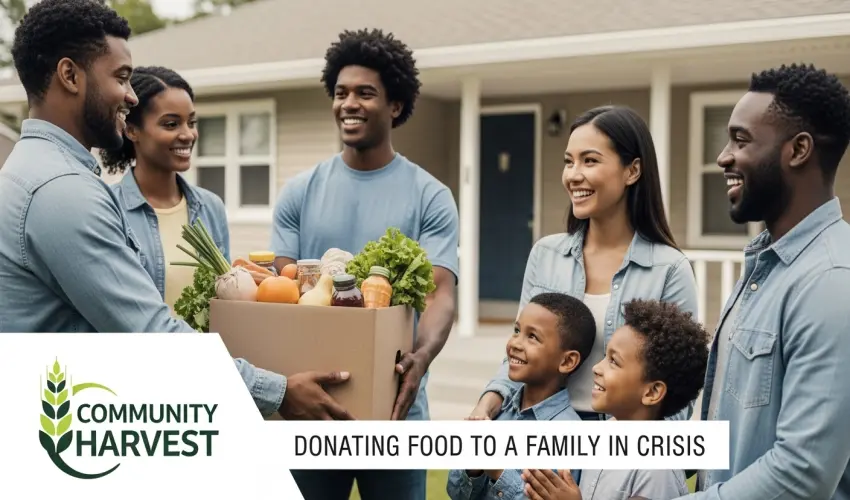Donating Food to a Family in Crisis: A Guide to Compassionate Giving
Donating food to a family in crisis provides more than a meal—it delivers hope. Discover the profound impact of this simple act of kindness and learn practical steps to support a family in need today.
Key Takeaways
-
Donating food to a family in crisis provides immediate relief, dignity, and emotional support.
-
Hunger is not just about missing meals; it involves stress, hopelessness, and a lack of basic needs.
-
Acts of kindness like food donations can create a ripple effect that inspires community-wide support.
-
The process of helping fosters empathy, connection, and a deeper understanding of the struggles many families face.
-
Even small contributions have a massive impact when done with compassion and consistency.
Introduction: The Power of One Meal
Imagine going to bed hungry, not because you chose to skip dinner, but because there was nothing in the kitchen to eat. For many families, this isn't a hypothetical—it's a painful daily reality. When a family is hit by a crisis, whether it's job loss, illness, or displacement, basic needs like food suddenly become a luxury.
Donating food might seem simple, but to someone in crisis, it’s everything. It's a message that says: You are not alone. This is a guide to how that simple act can become a powerful force for healing, hope, and humanity.
Understanding What a "Family in Crisis" Looks Like
A "family in crisis" could be anyone. It’s the single mother working two jobs but still unable to make ends meet. It’s the father who lost his job in an unexpected layoff. It’s the refugee family starting over in a new country. Crisis doesn't discriminate.
In these moments, food insecurity is often the first and most painful symptom. The fridge is empty, parents skip meals to feed their children, and the anxiety of “how will we eat tomorrow?” looms heavy.
The Emotional Weight of Hunger
Hunger isn’t just physical; it’s deeply emotional. When a parent can't feed their child, the guilt and shame can be unbearable. Many families won’t ask for help out of pride or fear of stigma. Giving a food package doesn’t just fill stomachs. It tells a struggling family:
-
“You matter.”
-
“Someone cares.”
-
“You haven’t been forgotten.”
That emotional boost can be just as nourishing as the meal itself.
A Personal Story: One Act of Kindness, One Transformation
I remember receiving a message from a friend at a local community center. A family of five had just moved into temporary housing after fleeing domestic violence. They had nothing. The mother hadn't eaten in two days so her kids could have the last of their food.
Within hours, my friends and I had packed bags with pasta, rice, fruits, milk, and snacks. When we delivered the boxes, the mother broke down in tears. She clutched a bag of groceries and whispered:
“I didn’t know people still cared.”
That moment changed me. That meal changed them.
Practical Steps to Donate Food to a Family in Need
You don’t need to wait for an organization to take action. Here’s how you can help:
-
Identify the Need: Connect with local shelters, churches, schools, or community centers. Ask social workers or check local social media groups for families in need.
-
Collect the Right Food:
-
Choose non-perishables: Pasta, rice, canned goods, boxed meals, and baby formula.
-
Add nutritional balance: Protein (beans, tuna), fruits (canned or dried), and grains.
-
Don’t forget extras: Spices, cooking oil, and snacks for kids.
-
-
Make It Personal:
-
Include a handwritten note of encouragement.
-
Add treats like cookies or juice boxes that kids will enjoy.
-
-
Respect Their Dignity:
-
Drop off donations discreetly.
-
Don't share their story or photos without explicit permission.
-
Give with humility, not for praise.
-
The Ripple Effect: How One Good Deed Inspires Another
Months after we helped that family, the mother reached out. She was stable, working, and volunteering at the same community center that once helped her.
“I wanted to give someone else the feeling you gave me,” she said.
That’s the ripple effect of kindness. Your donation may not just feed a family; it could ignite a legacy of giving that continues for years to come.
Beyond the Food: Creating a System of Support
When a family is in crisis, they need more than just food—they need a village. Your donation often opens the door to a larger support system, including:
-
Social services and counseling.
-
Employment programs and job placement.
-
Childcare support and housing solutions.
Once a family feels safe and seen, they are more likely to seek other forms of help. That one meal can be a gateway to long-term healing and stability.
Conclusion: Food as a Universal Language of Care
Food does more than nourish the body; it communicates care. Donating food to a family in crisis isn’t just charity. It’s humanity in action.
It’s a way of saying:
“I see you. You matter. And you’re not in this alone.”
You don’t need to be wealthy or part of a large organization to make a difference. All you need is the desire to help and the courage to act.
Join the conversation
Share how this story resonates with your journey. We feature standout reflections in our newsletter.

